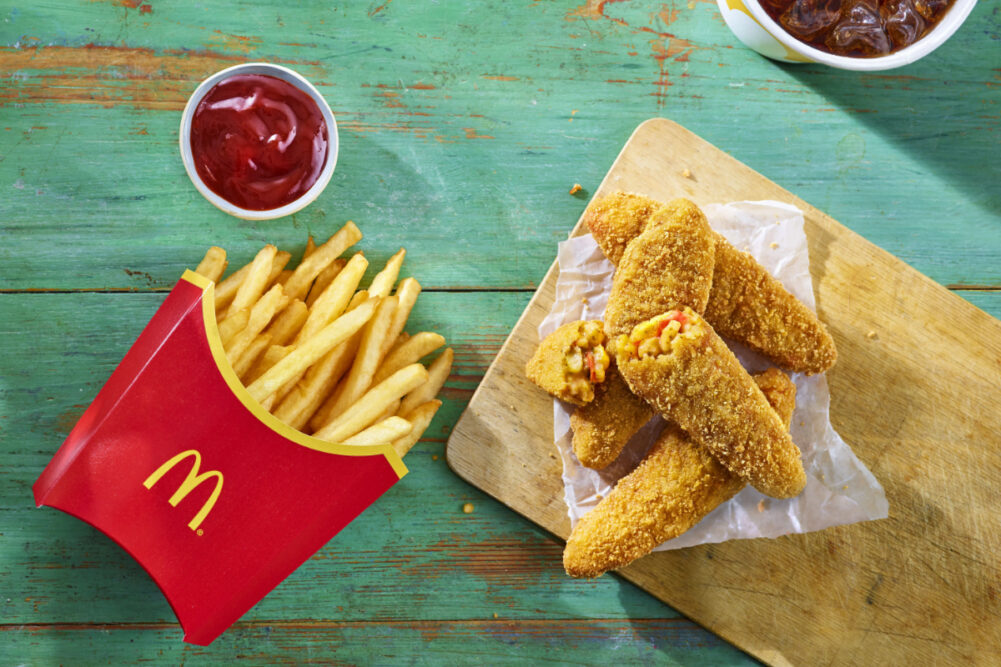KANSAS CITY — While the number of consumers who claim to lead a vegan lifestyle has remained small and steady, the number of food and beverage products making a vegan claim has risen. The difference highlights the changes taking place in the market for plant-based products and demonstrates how manufacturers are trying to develop points of differentiation in the market as it achieves mainstream status.
The number of consumers identifying as vegan is less than 1% of the total U.S. population, according to The NPD Group, Chicago. In its “The future of plant-based snapshot” report, NPD said consumers identifying as vegetarian or vegan represent less than 3% of the population, with 2% identifying as vegetarian and 0.7% identifying as vegan.
Yet data from Mintel’s Global New Products Database show the number of food and beverage products making vegan claims from 2015 to 2019 has risen 105% (the research firm does not disclose specific numbers as a matter of policy). The top three product categories making vegan claims were meat substitutes, meal replacement and other beverages, and snack, cereal and energy bars.
The International Food Information Council Foundation (IFIC), Washington, predicted that in 2020 environmental concerns will continue to drive adoption of plant-based diets. However, consumers’ conceptions of plant-based diets vary, reflecting a fragmentation of the market, according to IFIC. In a survey, 32% of consumers said a plant-based diet is a vegan diet, while 30% define it as a diet that emphasizes minimally processed foods that come from plants, with limited consumption of animal meat, eggs and dairy. Twenty per cent said a plant-based diet is vegetarian and one that avoids animal meat while 8% said it is a diet in which you try to get as many fruits and vegetables as possible, with no limit on consuming animal meat, eggs and dairy.
The food service market research company Technomic, Inc. identified veganism as one of its leading global trends for 2020. Aaron Jourden, senior research manager for Technomic, said, “The no-animal-products diet has never exerted more influence on the food and beverage industry.” But, he added, it does not mean consumers are going animal-free. They see animal-free as a way to eat healthier, do their part for the environment or be a part of the latest eating trend.
At the beginning of the year, McDonald’s Corp.’s United Kingdom business unit rolled out its first vegan meal. The Veggie Dippers are made with red pepper, rice, sundried tomatoes, pesto and split peas surrounded by breadcrumbs and launched Jan. 2 in McDonald’s U.K. and Ireland restaurants. Customers are now able to order the chain’s first vegan meal by pairing Veggie Dippers with vegan accredited french fries and any soft drink or sauce.
“In the last 12 months we’ve seen an 80% uplift in customers ordering vegetarian options at McDonald’s, so it is time for the brand famous for the dippable McNugget to launch a dippable option for our vegetarian, vegan and flexitarian customers,” said Thomas O’Neill, head of food marketing at McDonald’s U.K. and Ireland.
In 2019, Chipotle Mexican Grill, Inc., Newport Beach, Calif., introduced its Lifestyle Bowl platform. Among the products available are a vegan and a vegetarian option. The vegan option features brown rice, black beans, plant-based Sofritas, tomato salsa, roasted chili-corn salsa and shredded romaine lettuce while the vegetarian option includes ‘supergreens,’ brown rice, black beans, fajita vegetables, tomato salsa, sour cream and guacamole.
The efforts by both McDonald’s U.K. and Chipotle Mexican Grill underscore how fragmentation of the plant-based category is pushing product developers to formulate plant-based options to fit a variety of consumer preferences





